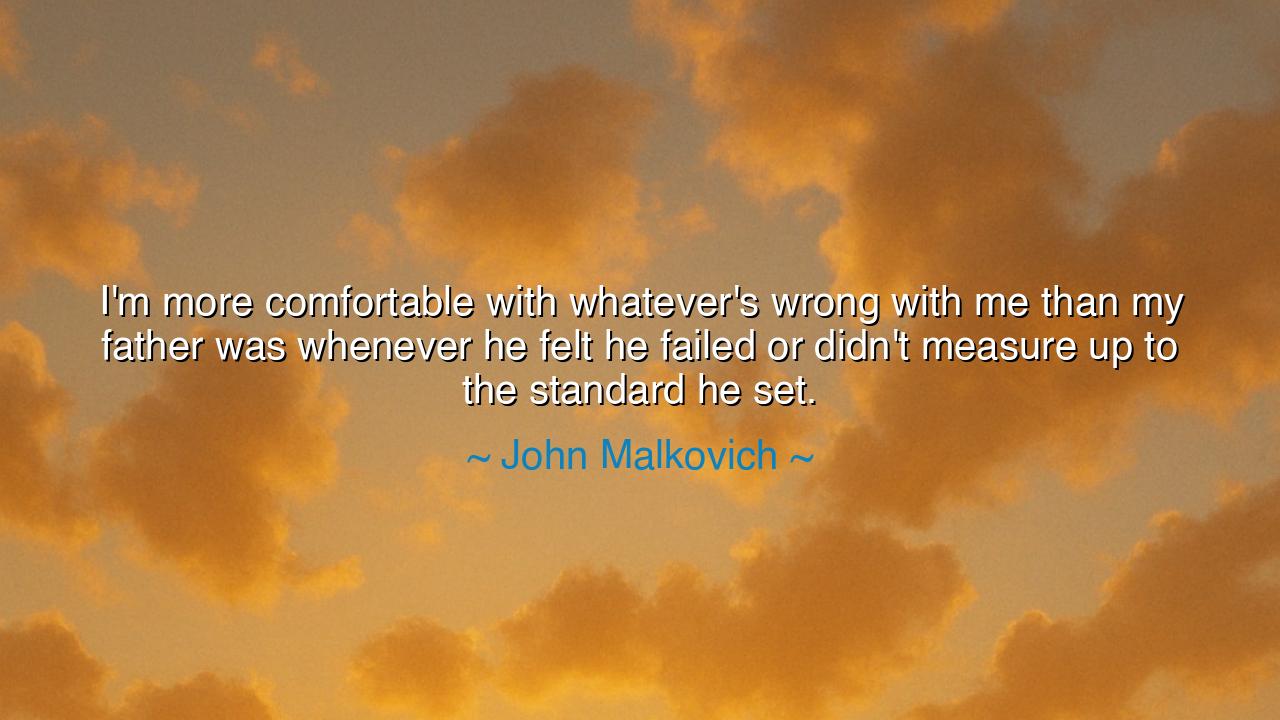
I'm more comfortable with whatever's wrong with me than my father
I'm more comfortable with whatever's wrong with me than my father was whenever he felt he failed or didn't measure up to the standard he set.






In the words of John Malkovich, “I’m more comfortable with whatever’s wrong with me than my father was whenever he felt he failed or didn’t measure up to the standard he set.” These words, reflective and deeply human, reveal not only the difference between two generations, but the quiet evolution of the human soul toward acceptance. Malkovich, a man of great intensity and inner depth, speaks here not as an actor but as a philosopher of his own life. His quote is not about weakness, but about wisdom — the understanding that peace is found not in perfection, but in the ability to live with one’s flaws. Where his father wrestled with failure as though it were shame, Malkovich has learned the nobler art of forgiveness toward the self.
The origin of this quote lies in Malkovich’s reflections on his upbringing and his relationship with his father, who was a man of discipline, conviction, and moral rigor. His father, like many of his time, belonged to a generation forged in hardship — men who were taught to be strong, restrained, and relentless in pursuit of their ideals. To them, failure was not merely a setback; it was a wound to the soul. But Malkovich, born into a different age, carries another kind of strength: the courage to embrace imperfection. In acknowledging what is “wrong” with himself — his flaws, his quirks, his humanity — he breaks the cycle of self-judgment that haunted the men before him.
The ancients understood this conflict well. The Stoic philosopher Seneca wrote that “a man cannot find peace by fleeing himself; he must make peace with himself.” Many have sought to escape their own perceived shortcomings, but the wise have always known that self-acceptance is the first victory of the soul. Malkovich’s insight echoes this timeless truth: that happiness begins not with the eradication of fault, but with understanding. His father’s struggle, like that of countless men before him, was the pursuit of an unattainable ideal — to be flawless, steadfast, and unbroken. Yet life, as all who live it discover, does not yield such purity. The heart’s strength is not measured by its perfection, but by its capacity to endure and forgive itself.
Consider the story of Abraham Lincoln, a man revered for wisdom and integrity, yet haunted throughout his life by melancholy and doubt. He often wrote of his failures and inner darkness, but unlike many of his contemporaries, he did not hide from them. He wore his sorrow as one wears an old cloak — not with pride, but with honesty. Out of his pain came empathy; out of his doubt came greatness. Like Malkovich, Lincoln found peace not in denying what was wrong within him, but in using it as a bridge to understanding. It is the same wisdom that allows a flawed man to become a whole one.
Malkovich’s quote is not merely personal; it speaks to the transformation of human consciousness over generations. In his father’s time, strength was silence, and vulnerability was weakness. Men bore their burdens inwardly, fearful of appearing less than perfect. But Malkovich stands as the voice of a new understanding — that acknowledging our brokenness is itself an act of courage. To be “comfortable with whatever’s wrong” is not to be complacent, but to live truthfully, without illusion. It is to stand before the mirror of the soul and say, “This is who I am — imperfect, yes, but still worthy of peace.”
There is also humility in his words — the recognition that every human being carries both light and shadow. To accept one’s flaws is to accept the full spectrum of existence. In contrast, to reject them is to live divided, at war with oneself. The ancients called this inner harmony ataraxia — the serenity of a soul no longer tormented by what it cannot change. Malkovich’s father sought fulfillment in meeting an external standard; the son finds it in internal balance. The difference is subtle yet immense: one is bound by expectation, the other freed by awareness.
The lesson, then, is this: seek peace, not perfection. Understand that failure is not the enemy, but the teacher; that flaws are not blemishes, but fingerprints of your humanity. Learn to hold your shortcomings gently, as one might hold a fragile object — not to protect weakness, but to preserve compassion. In a world that prizes success, remember that peace of mind is the higher reward. Practice self-honesty, and from that honesty, let acceptance grow. For only when you make peace with yourself can you bring peace to others.
So remember the quiet wisdom of John Malkovich: to be comfortable with your own imperfections is to be free. Do not chase the ghost of who you think you should be; embrace the reality of who you are. For the one who accepts himself, faults and all, carries a strength that neither failure nor judgment can shake. Like a river that flows around its stones, he moves with grace through the roughness of life — unbroken, unashamed, and at peace.






AAdministratorAdministrator
Welcome, honored guests. Please leave a comment, we will respond soon